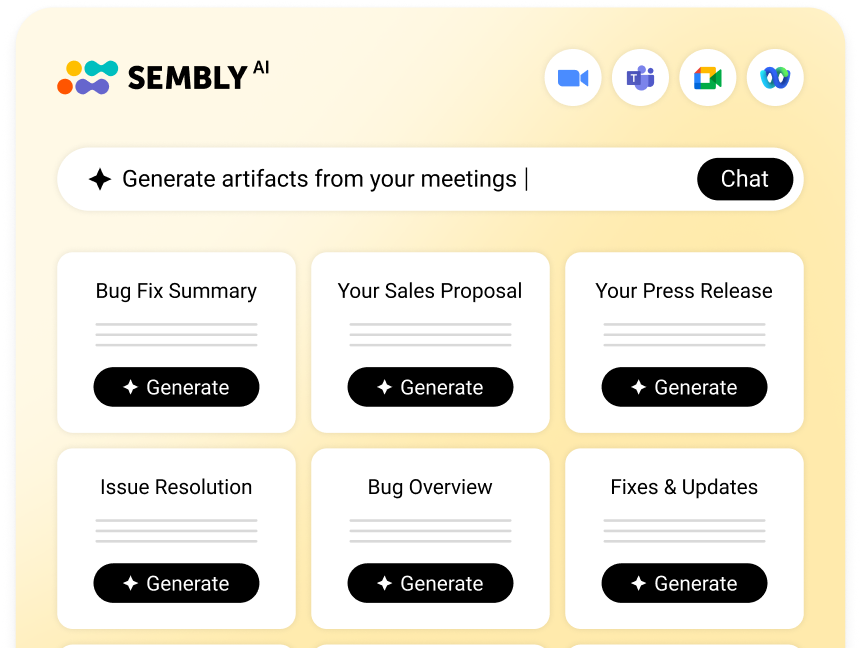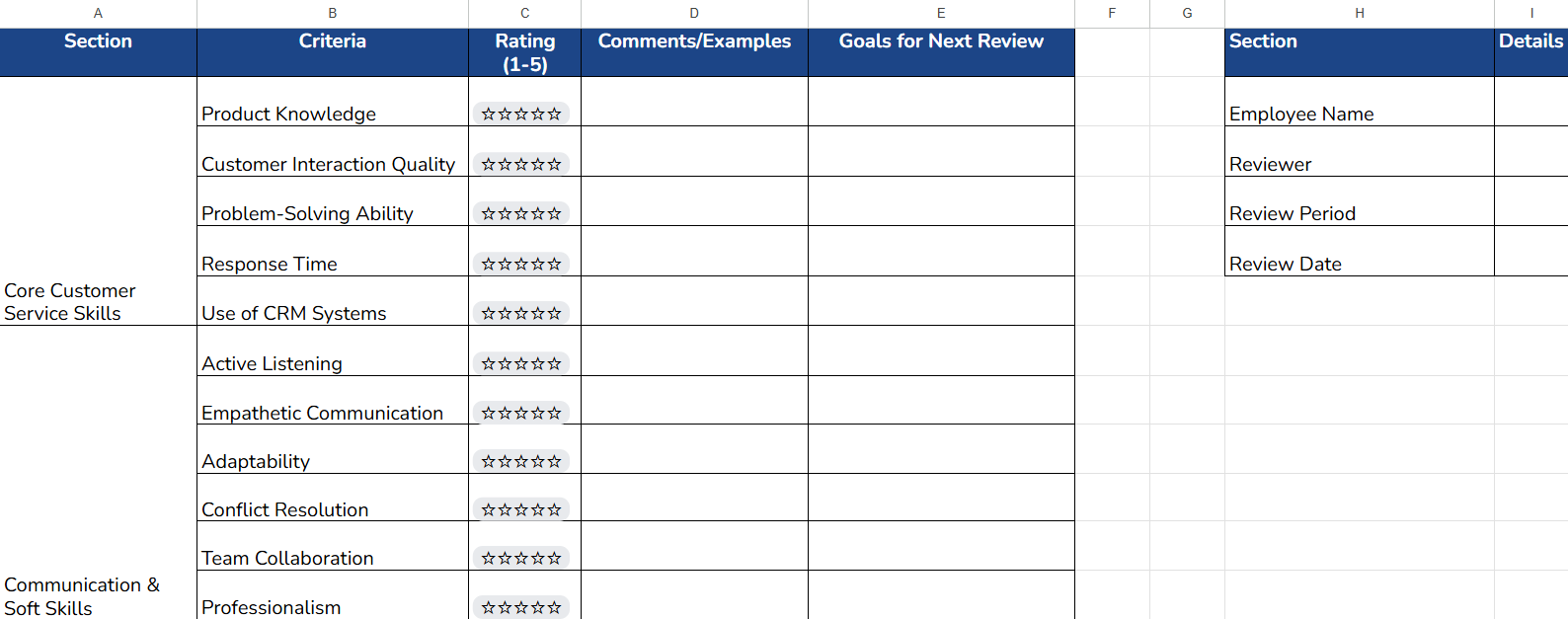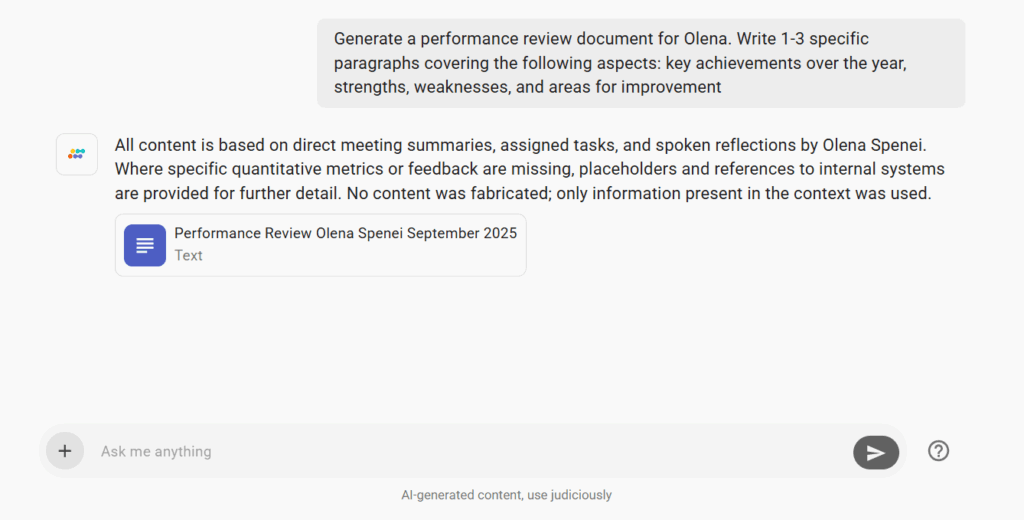Table of Contents
ToggleCustomer service turnover already reaches 30-45%, which is among the highest in any industry (Insignia Resources). The reason? Employees do not get constructive feedback or recognition they deserve, or they simply do not see their growth within the company. Around 20% of professionals state a lack of career development and opportunities as one of the reasons they quit (Huntsville Business Journal). In support, where agents walk hand in hand with stress, it is especially crucial.
There is a moment when you wonder: How do you review someone who deals with frustration daily? Furthermore, how do you create a positive environment to encourage customer representatives to stay? I am about to show you the best customer service performance review examples. Let’s dive in!
What Is a Customer Service Review?
A customer service performance review is a structured evaluation of a support specialist’s work. For example, how quickly they respond to inquiries, how well they handle complaints, collaborate with team members, and resolve issues under pressure. However, the goal is not just to rate the quality of work, but to identify strengths & weaknesses, and encourage employees to grow.
The Importance of Customer Service Performance Reviews
Provided support managers host evaluations correctly, reviews can improve employee engagement, foster team collaboration, and empower organizational values. However, that’s not all the advantages the process provides.
Let’s take a closer look at some of the cases of how these assessments can help:
- Detect burnout: Regular feedback helps team leaders identify signs of stress before they escalate.
- Improve customer satisfaction: Employees who receive constructive feedback and go through training sessions provide more consistent service.
- Strengthen customer service skills: With the right review phrases, managers can guide their agents toward better time management and communication techniques.
The main idea is clear: a good customer service review revolves around the employee and their wins & challenges, so the rest of the time, professionals focus on customers and business goals. Think of it as an investment in the future success of the team.
Benefits of Effective Feedback
Now that we have settled the importance of employee assessments, I believe it is time to get deeper into the benefits of reviews.
Here are some of the key ones I have picked:
- Reduced “invisible effort”: A brief note from a manager acknowledging emotional tasks that agents handle can help to keep morale up.
- Space for micro-innovation: Encouraged specialists often try to do more than expected: they find creative solutions to problems, suggest product updates, or new customer interaction strategies. Your comments can put employees on this path.
- A sense of clarity and direction: Customer service evaluation comments based on actual examples provide employees with clarity on their progress and give a sense of direction.
- Leadership potential: Each support performance evaluation is a chance to identify leadership potential and help employees develop this skill.
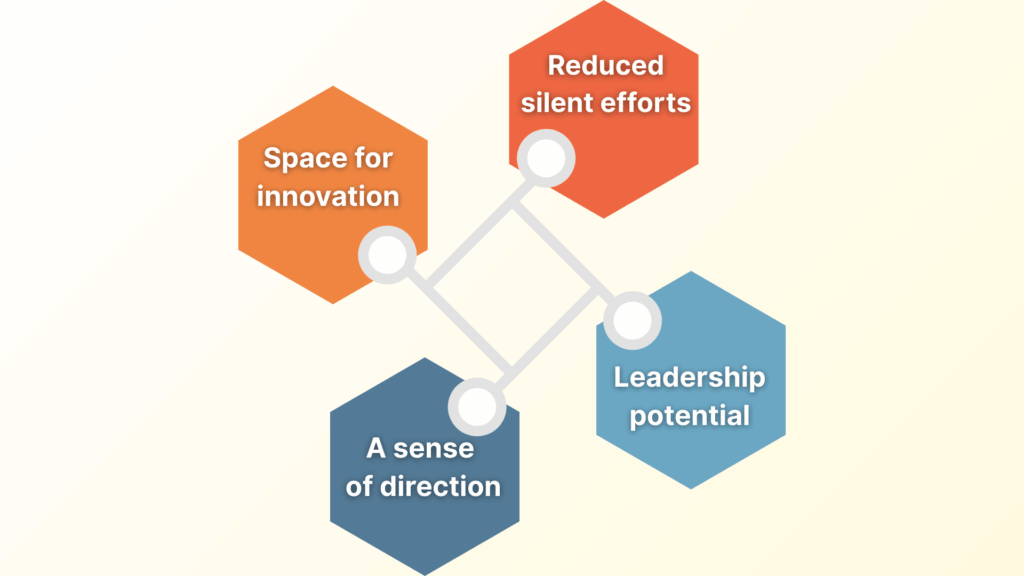
In the end, your feedback is what brings every team member closer to success, so try to make every word count.
Understanding Performance Review Phrases
If you have doubts about the importance of proper wording, then I have some performance review statistics that show the reality of the process:
- Less than 20% of employees feel inspired by their performance reviews (SHRM).
- Only 1 in 3 professionals believe they were evaluated fairly (SHRM).
- Only 30% of employers stated that their performance reviews support career development (SHRM).
Now, think about customer service professionals who have to deal with negativity on a daily basis. In their cases, performance evaluations often give the recognition & support they need, provided managers choose the customer service review phrases correctly.
Customer Service Performance Review Phrases by Category
This is what you came here for: customer service evaluation comments, so I suggest that we get straight to business. In this section, you will find examples split into different categories for better navigation. Let’s get into it!
Team Collaboration
Strong teamwork is all about aligning on goals, sharing knowledge, and stepping up when others need your help. When done right, it can reduce ticket handoffs and improve problem-solving & employee performance.
These customer service comments will help you host the evaluations professionally:
- “[Agent Name] demonstrates exceptional team collaboration. Proactively shares updates, steps in to help colleagues resolve issues, and contributes to team goals.”
- “[Agent Name] plays a key role in creating a positive team environment that impacts productivity and support quality.”
- “[Agent Name] communicates with teammates during escalations, shares personal knowledge, and steps in to handle complicated cases.”
Consistent Customer Satisfaction
What’s a better foundation for client loyalty and retention than customer satisfaction? In this section, you will get customer service performance review phrases that focus on how well an agent works in that direction.
- “[Agent Name] maintains high client satisfaction scores by quickly resolving issues and proactively following up on all customer inquiries.”
- “[Agent Name] balances empathy, speed, and technical precision. Works well under pressure and during peak response time periods.”
- “[Agent Name] effectively handles customer complaints and has strong communication skills. Demonstrates commitment to performance goals.”
Active Listening
Active listening helps support professionals to be fully present, interpret cues, ask clarifying questions, and respond with empathy. The result? Customers feel understood and valued, and can put more trust in the brand.
Let’s take a look at 2 examples of comments you can provide your agents with:
- “[Agent Name] creates meaningful customer interactions by picking up on tone, phrasing, and context, which improves customer satisfaction.”
- “[Agent Name] actively encourages and documents customer feedback. Extracts key insights from each conversation.”
Empathetic Communication
Let’s be honest: empathetic communication is the heart of customer service. It’s important that agents adjust their tone, defuse tense moments, and reflect the brand’s values, regardless of the situation.
Customer service reviews are the right moments to assess these skills and encourage employees to continue.
- “[Agent Name] demonstrates high emotional intelligence in communication, using tone and phrasing that validates the customer experience.”
- “[Agent Name] adjusts communication style based on customer feedback and context, which results in higher CSAT scores.”
- “[Agent Name] builds a positive environment even in challenging situations, increasing customer satisfaction.”
Adaptability
Products change, platforms crash, or customer expectations shift overnight, so adaptability is a new must. Why? It fuels problem-solving and strengthens decision-making. Adaptable representatives can adjust their language, handle multiple tickets simultaneously, or master complex tools.
Let’s take a look at customer service performance review phrases you can use:
- “[Agent Name] adjusts approach based on company policies or shifting customer inquiries, maintaining high service quality.”
- “[Agent Name] adapts to changing workflows without compromising productivity or task management.”
Conflict Resolution
Support professionals often walk the line between frustrated clients and company policy, so conflict resolution is another must on our list. Top-performing agents should know how to turn tense situations into manageable cases and maintain customer satisfaction at the highest level possible.
These phrases will strengthen your customer service reviews and help you provide valuable feedback on conflict resolution:
- “[Agent Name] demonstrates excellent communication skills in de-escalating difficult customer interactions. Shows maturity when facing client pushback.”
- “[Agent Name] approaches disagreements with professionalism, leading to faster response times and better customer satisfaction rates.”
Product Knowledge
Strong product knowledge shortens response time, reduces unnecessary escalations, and improves first-contact resolution. You can think of it as a core driver of customer satisfaction.
These customer service review examples will help you improve your evaluations:
- “[Agent Name] demonstrates a deep understanding of product offers, which results in more confident customer interactions and fewer escalated cases.”
- “[Agent Name] participates in training programs to deepen the product knowledge and reduce gaps in support coverage.”
These phrases for support evaluations conclude our sections with categories, as we continue to review other examples. This time, they revolve around constructive feedback.
Constructive Performance Review Phrases
Want to help your customer service personnel grow? Your employee evaluations need constructive feedback. Luckily, this section is all about comments and examples that will help you bring all the words you have in mind to life.
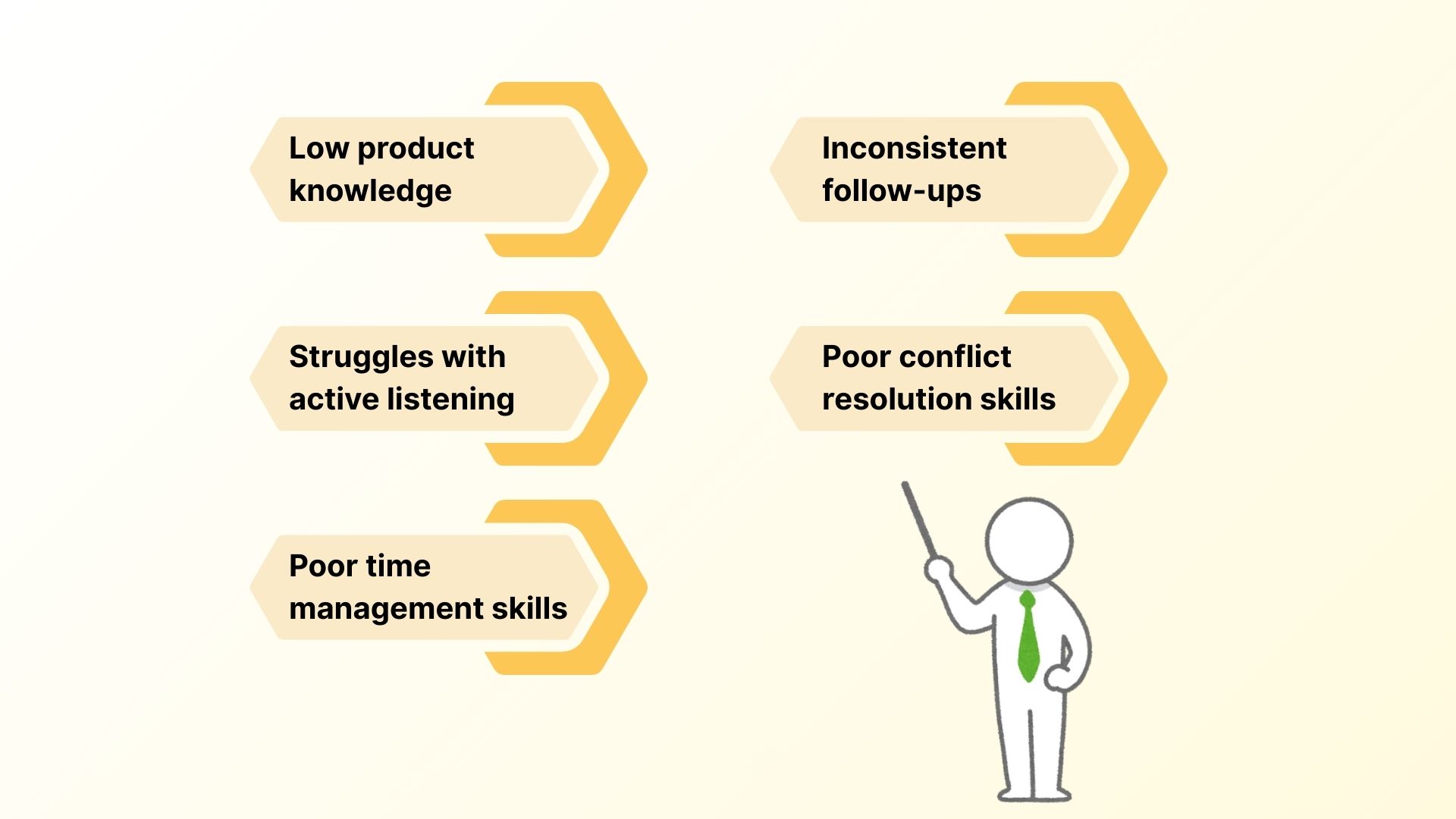
Needs Improvement in Time Management Skills
Poor time management often results in missed deadlines, delayed responses, and frustrated clients. There is no denying that it’s crucial for maintaining positive customer experiences, but how do you put the idea into words?
Here are the customer service performance review phrases managers can use:
- “[Agent Name] needs support in structuring daily workload to reduce delays and improve productivity.”
- “[Agent Name] would benefit from training and shadowing from top-performers.”
- “[Agent Name] sometimes lacks visibility into personal workload progress. I recommend trying a performance management tool or dashboard for tracking.”
Inconsistent Follow-Up with Customers
No customer service employee performance reviews go without feedback on follow-ups. Any struggles with this point can lower performance ratings and decrease client satisfaction levels. Ideally, constructive comments focus on improving accountability, with clear performance indicators to measure progress. For example:
- “[Agent Name] needs to work on consistency in follow-ups to improve customer satisfaction and ensure ticket closure within 2 days.”
- “[Agent Name] should use available tools for call recordings and meeting transcripts to track next steps and create personalized & consistent follow-ups.”
Requires Better Conflict Resolution Skills
Poor resolution skills often escalate concerns, damage long-term customer relationships, and lower performance ratings. Needless to say, it’s required that managers highlight these problems in their feedback. Here are a few examples:
- “[Agent Name] struggles to de-escalate conversations. Consider using coaching modules or peer shadowing to build confidence.”
- “[Agent Name] would benefit from structured conflict resolution frameworks within our HR software or employee workshops.”
Needs to Enhance Product Knowledge
Some of the best customer service evaluation examples include points on product knowledge. Traditionally, I have prepared a few phrases that can be useful in your next employee assessments:
- “[Agent name] often relies on team members for product-related answers. It’s recommended to use internal knowledge bases and product sessions.”
- “[Agent Name] demonstrates limited understanding of features, which occasionally leads to confusion. It’s recommended to visit a few sessions with the product team.”
Should Improve Active Listening
Support specialists who struggle with active listening often fail to reach high CSAT ratings. These things can happen, but they do not have to become a constant reality.
Here are performance review comments for customer service agents who need help improving their active listening:
- “[Agent Name] interrupts customers before they finish explaining the issue. It’s advised to apply 360-degree feedback learnings to improve engagement.”
- “[Agent Name] misses key customer details during conversations. It’s recommended to review feedback techniques and develop better active listening habits by attending employee workshops.”
Negative Performance Review Phrases
It is only a matter of time before a support manager needs to provide their first negative feedback. It is often stressful, and questions like “How do I say it without sounding aggressive or offensive?” keep appearing. Well, not anymore!
I have prepared some performance review phrases for customer service that will help you work with negative feedback.
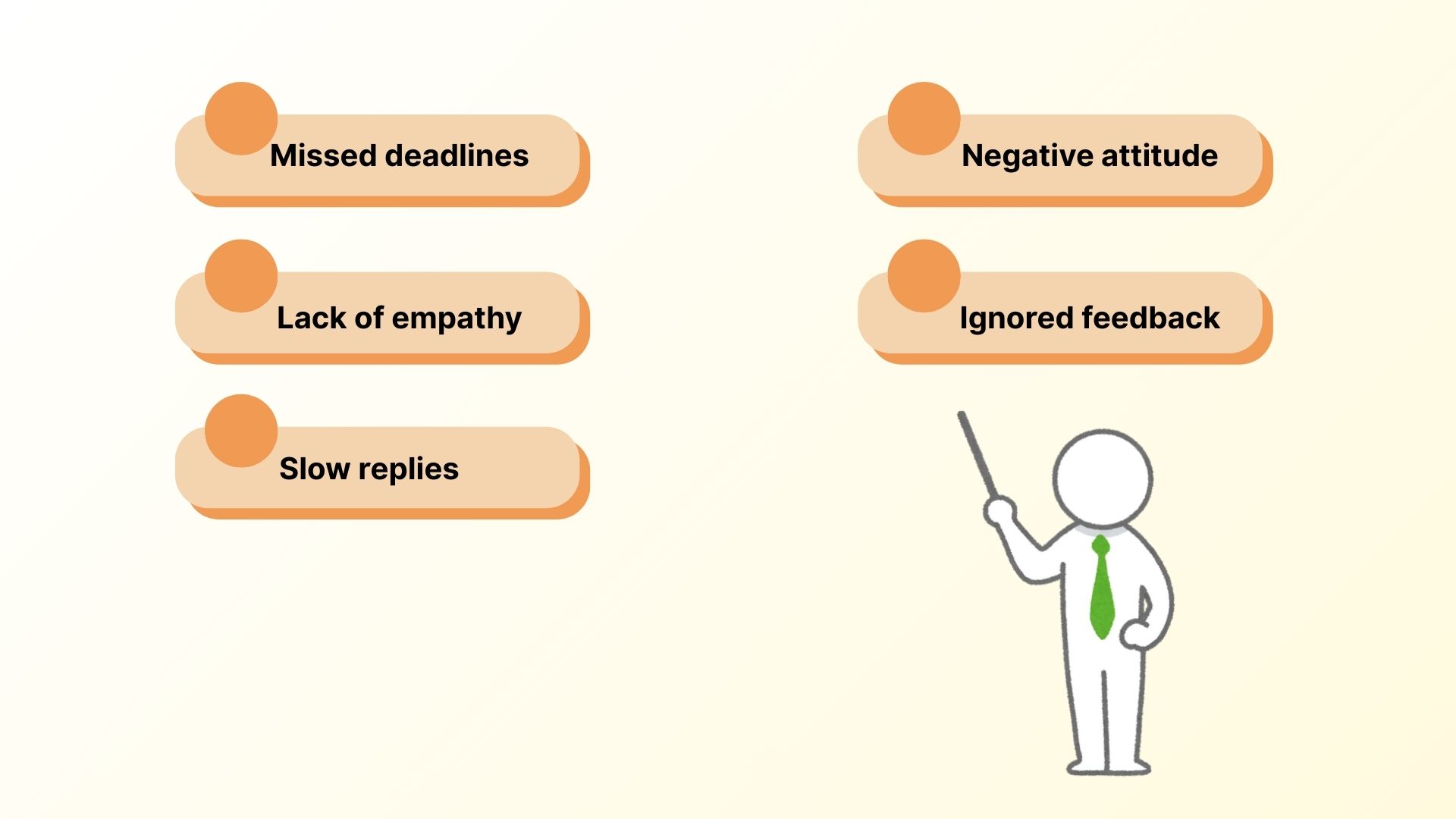
Often Misses Deadlines
Missed deadlines are a shortcut to decreasing customer loyalty and satisfaction. Besides, they often slow employee growth or even make it impossible, so it’s only logical that this feedback has to be part of your assessments.
Here are the phrases you can use:
- “[Agent Name] often fails to meet project deadlines, which negatively affects performance ratings.”
- “[Agent Name] struggles with time assessments and requires support in deadline estimation.”
Poor Response Time to Customer Queries
Poor response time is another way to kill customer experience. We can all agree that waiting hours for a reply when it’s stated their window is 15 minutes is quite frustrating.
Should your agents experience issues with responses, use these customer service performance review phrases:
- “[Agent Name] needs to align with established SLA timelines to improve results and provide support quality.”
- “[Agent Name] fails to acknowledge inquiries in a timely manner, which creates poor first impressions.”
Lacks Empathy in Customer Interactions
While empathy de-escalates conflict and improves the customer experience, a lack of it creates emotional distance. Clients feel misunderstood and ignored, and as a result, their loyalty declines.
If you need to provide feedback on a lack of empathy, use these customer service evaluation comments:
- “[Agent Name] fails to personalize responses, which hurts support quality and negatively impacts team results.”
- “[Agent Name] responds with generic macro; needs empathy training and feedback on accountability.”
Unwilling to Accept Feedback
Another problem support managers can come across is the unwillingness to accept feedback. It often stalls employee growth and makes it impossible to work on improvements.
Should you ever face this situation, try the phrases below:
- “[Agent Name] resists constructive input and often challenges managerial recommendations.”
- “[Agent Name] fails to act on improvement points and shows low engagement with performance management goals.”
Negative Attitude Affecting Team Morale
These customer service review examples revolve around a negative attitude. With no lengthy introductions, I suggest that we review the phrases as it’s clear that negativity should be addressed promptly:
- “[Agent Name] displays consistent pessimism during team calls, affecting morale and employee engagement.”
- “[Agent Name] dismisses new ideas or initiatives and discourages open discussion.”
Positive Performance Review Phrases
After a pinch of negativity, I suggest that we move to the pleasant part of this article: positive customer service performance review phrases. Let’s dive in!
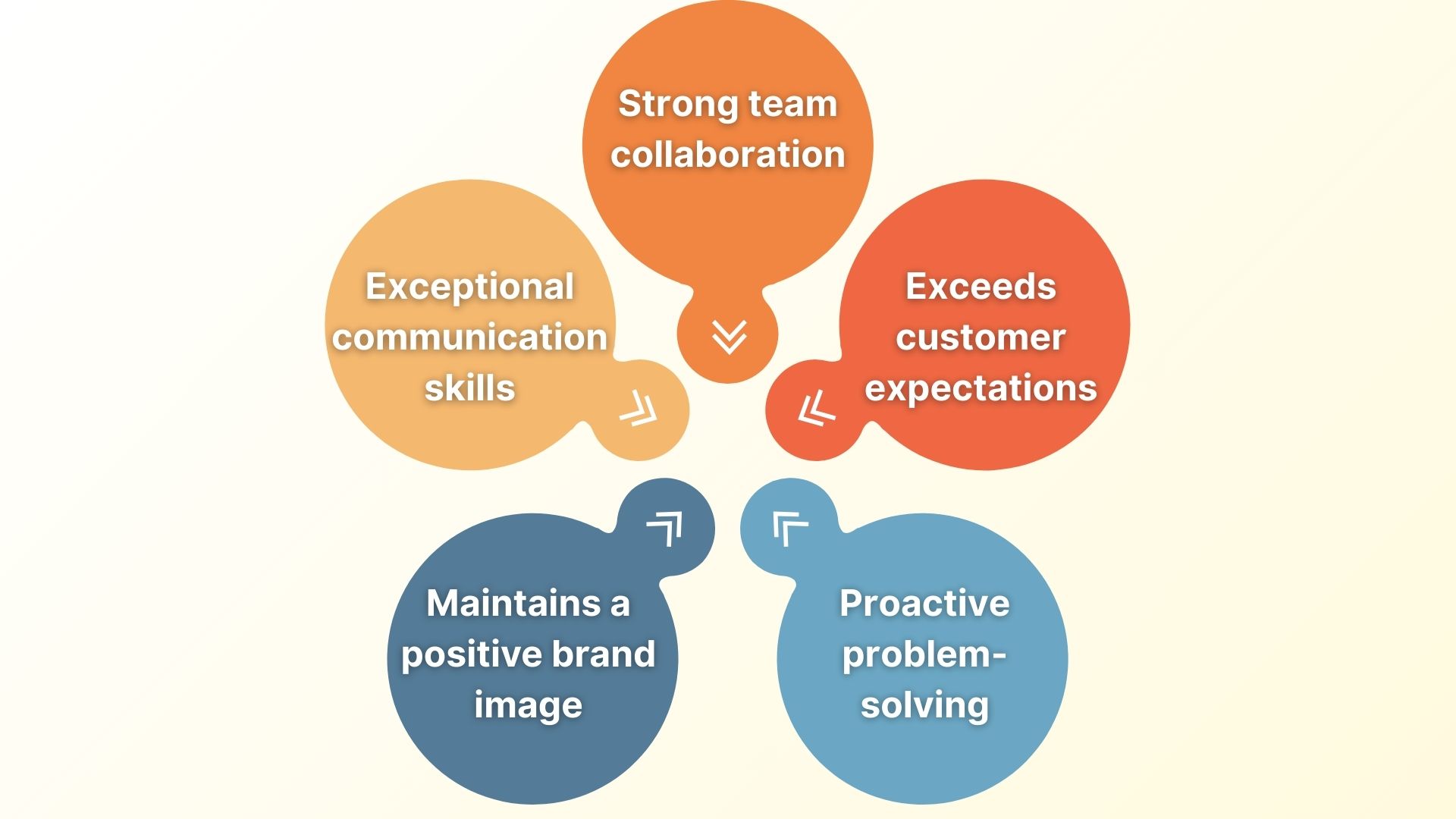
Consistently Demonstrates Professionalism
Professionalism is the foundation of excellent customer relationships and internal trust. And what’s a better way to motivate specialists if not during performance appraisals?
Here are the phrases you can use:
- “[Agent Name] maintains a consistently professional tone in all customer interactions, even during stressful situations.”
- “[Agent Name] takes ownership of responsibilities with minimal supervision. Represents the company brand with confidence.”
Exceptional Communication Skills
Do you have any professionals who show exceptional communication skills? Then these performance appraisal phrases are exactly what you need:
- “[Agent Name] communicates complex topics in a simple, friendly way, improving customer experience across all touchpoints.”
- “[Agent Name] demonstrates strong written and verbal communication skills. Regularly receives praise from customers and team members.”
Exceeds Customer Expectations
Meeting expectations is good. But great representatives go the extra mile, and they deserve your acknowledgment.
Here are the comments you can use during your support employee evaluations:
- “[Agent Name] suggests alternative workarounds that lead to improved support quality and retention.”
- “[Agent Name] is recognized by team leads and team members for consistently exceeding KPIs.”
- “[Agent Name] builds emotional connection and trust, which is reflected in positive customer feedback.”
Proactive Problem-Solving
Another skill that deserves highlighting is proactive problem-solving. Traditionally, I have prepared a few phrases you can use in your customer service performance reviews:
- “[Agent Name] demonstrates exceptional problem-solving skills under pressure.”
- “[Agent Name] takes ownership of escalations and turns them into success stories.”
- “[Agent Name] uses meeting transcripts and customer history to troubleshoot more effectively.”
Strong Team Collaboration
Last but not least is team collaboration. Top performers do not just shine on their own. Instead, they often support others and help the whole team thrive.
These review phrases will help you highlight the best collaborators:
- “[Agent Name] consistently offers help to team members, even outside their assigned tasks.”
- “[Agent Name] collaborates with multiple departments to improve the internal knowledge base and the quality of service.”
Now that you know the comments you can use, how about a template for customer support reviews?
Customer Service Performance Review Template
It is always easy to share pieces of advice, but the moment you need to bring those recommendations to life is when the challenge begins. I know for a fact how much time creating templates requires, so I have prepared a quick example you can use as a foundation. It mentions all the points we have discussed and is ready for your customization.
Tips for Writing Effective Performance Reviews
The phrases and a template are now off the list. All we have left are the tips that can perfect your support evaluations.
Here are five rules I have prepared to make your reviews sharper and more professional.
1. Be Specific and Objective
Avoid vague general phrases such as “good attitude” or “needs improvement.” Instead, break down the review into clear performance categories. For example, communication skills, problem-solving, and time management.
Tip: Use data from CRM systems, call recordings, or AI tools to base your assessments on actual data.
2. Use Real-Life Examples
Feedback carries more weight when it’s grounded in real moments. Try to tie your comments to specific actions and outcomes. It helps professionals understand what exactly their manager refers to. As an example, you can extract information from meeting transcripts, chat logs, or support tickets.
3. Balance Positive and Constructive Feedback
Even when you need to address performance issues, recognize what the employee does well. This way, your feedback does not look “all black,” and there is a moment of optimism for an employee to enjoy.
Tip: Use the feedback template method: Observation → Impact → Recommendation.
4. Set Clear Goals and Expectations
Let’s be honest, vague objectives lead nowhere. Instead, define success using SMART performance goals (Specific, Measurable, Achievable, Relevant, Time-bound). You can use a performance rating scale or 9-box grid to visualize employee growth potential vs. actual performance.
5. Encourage Open Communication
Invite professionals to share their ideas, reflect on goals, and voice feedback. This builds trust between a manager and an employee, improves feedback cycles, and aligns expectations on both ends. What else can you ask for?
Tip: You may use performance management tools or agentic AI for HR to track progress over time.
Using Sembly AI in Customer Service Reviews
What if you could create a good review for customer service automatically? With Sembly AI, it is possible, and you do not have to sacrifice quality. Not only does it record, transcribe, and analyze meeting content, but it can also generate structured documents for your evaluations. There is no need to dedicate time to manual note-taking and hours going through your recordings to find important comments or the agent’s feedback, and I am about to show you how!
Here are the steps you need to take:
- Go to My AI Chats within your Sembly account.
- Click A New AI Chat button.
- Type: “Generate a performance review document for [Employee Name]. Write 1-3 specific paragraphs covering the following aspects: key achievements over the year, strengths, weaknesses, and areas for improvement.”
- Wait a few minutes and it’s done!
Wrapping Up
A good performance review for customer service specialists is an opportunity to gain insights into their performance, uncover both weaknesses and strengths, and get a sense of direction for future career development. Surely, this only applies to the cases when a manager has valuable information to share. The key? Use real data, refer to actual situations, balance constructive feedback with positive notes, and be precise. This way, your evaluations help support professionals improve their skills and quality of work.
In this article, I have shared 50 best customer service performance review phrases for different occasions, and I hope they will help you during your next call. Good luck!
FAQ
What are performance review phrases?
Performance review phrases are professional expressions managers can use during employee evaluations. These phrases help leaders communicate feedback clearly and consistently across all categories: communication skills, problem-solving, customer satisfaction reviews from chats, and goal progress.
How often should customer service performance reviews be conducted?
Most common frequency for customer service performance reviews is a quarterly one. It allows enough time to measure progress, provide feedback, and adjust performance goals. However, monthly one-on-ones or check-ins can help keep employee performance on track between formal review cycles.
What is the best way to give constructive feedback in customer service?
- Focus on behavior, not personality.
- Use real-life examples, tie feedback to performance goals.
- Suggest actionable improvements.
- Employ feedback techniques like the SBI model (Situation-Behavior-Impact) to make feedback objective.
When done well, this approach supports employee growth, fosters a culture of improvement, and builds customer loyalty.
How can you make a customer service performance review clear and concise?
Here are the top 3 rules to make your customer service evaluation calls precise:
- Use a structured feedback template that separates key categories like communication, product knowledge, and problem-solving.
- Keep language specific and action-oriented.
- Focus on measurable performance indicators.
- Stick to the evaluation agenda to ensure alignment with your schedule.
What to say in an exceptional performance review?
- Start with sincere recognition of the employee’s contributions and link their achievements to company goals.
- Highlight strengths such as professionalism or proactive problem-solving.
- Use performance appraisal phrases and pair them with development suggestions to show long-term value.
What should employers include in a performance review?
A great customer service review sample should include the following:
- Specific examples of strengths and challenges
- Review of core KPIs (e.g., response time, customer satisfaction data)
- Ratings using a clear performance rating scale
- A section on training and support needs
- Future performance goals and coaching opportunities
Is the process of writing a self-evaluation review different?
Yes. A self-evaluation encourages your personal reflection on strengths, challenges, and development goals. Unlike managerial reviews, that usually focus on team lead’s feedback, these assessments revolve around professional’s opinion.
While the categories stay the same, the approach itself differs.
Why use specific customer service performance review phrases?
The customer service performance review phrases help to eliminate vague feedback by targeting measurable behaviors: response time, customer interaction, or problem-solving skills. As a result, both managers and employees have a better understanding of the results and actions to improve them.
- Multi-meeting chats
- AI Insights
- AI Artifacts
